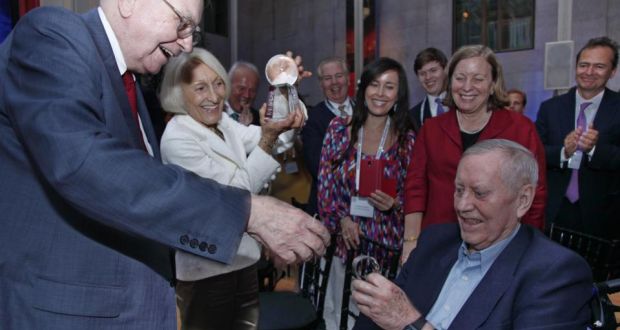Atlantic’s Culminating Grants: Cultivating Change
Resource type: News
Christopher G. Oechsli, President and CEO, The Atlantic Philanthropies |
In his latest instalment in a series chronicling Atlantic’s limited life, Tony Proscio at the Duke University Center for Strategic Philanthropy & Civil Society conjures the image of a harvest to describe our work in Atlantic’s final years. The metaphor is apt. We want to effectively realise and sustain gains in the core issues and fields that we and our grantees have seeded and cultivated over time to make what our Founding Chairman calls “the highest and best use” of our limited remaining funds.
To this end, Atlantic’s final grants will draw on several of the issues, themes and most effective approaches we have applied across our geographies and will be directed at initiatives and organisations that are at, or building towards, a tipping point – where access to opportunity and creating equity is achievable, especially for those who are vulnerable and face unfair obstacles.
To reap our historic investments and sow the seeds of change, our culminating grants aim to:
- Strengthen a small number of dynamic leadership organisations that have a long history with Atlantic and will provide critical, contributions toward the outcomes in which we’ve invested
- Support sustained human capital and leadership development around Atlantic’s historical work
- Leverage government funds to create and support more cost and outcome-effective policies that improve the lives of vulnerable individuals whose voices and opportunities have been disproportionately and unfairly restricted
- Promote the concept of Giving While Living.
Some of our most recent grants and developments in the United States, Northern Ireland and Republic of Ireland are examples of these efforts to build upon and augment the successes and advances that our grantees and partners have achieved.
Shaping Future Public Policy Debates: A New Institute
United States, economic security, policy
The Center on Budget and Policy Priorities (CBPP) is a dynamic leading organisation for nearly all of the issues Atlantic has focused on in the United States. For over 30 years (13 as an Atlantic grantee), CBPP’s high-calibre research and policy analysis has informed and guided the strategies and work of organisations, policymakers, and advocates working to reduce poverty and promote broadly shared economic security, racial equity, access to health care, and better opportunities for immigrants. Of CBPP, David Ellwood, Dean of Harvard’s Kennedy School of Government, said, “They are the one absolutely reliable source…, perhaps the most influential outside voice on budget and policy for the poor.”
While many recognise the invaluable benefit of CBPP’s in-the-moment, while-decisions-are-made fiscal and program policy analysis, the Center has not historically been able to devote extensive work to the longer-term policy issues and challenges that will be very important to the nation’s future. Were they able, the contribution would be invaluable.
To address these issues and challenges and help ensure that progress on issues of interest to Atlantic is sustainable well beyond our lifetime as a foundation, we are supporting CBPP to establish a new Institute within the Center, beginning in early 2015, for proactive policy development and implementation work on longer-term priorities regarding budget, revenue, safety-net, and social insurance policies that benefit low- and moderate-income families and individuals and are fiscally sustainable over the long run.
Cementing the Peace by Protecting Human Rights
Northern Ireland, Reconciliation & Human Rights, peace
The conflict in Northern Ireland was fuelled by abuses of human rights. Atlantic’s grantmaking has helped cement the peace by supporting independent organisations to tackle those abuses and ensure that government meets its human rights obligations. Organisations like the Committee on the Administration of Justice (CAJ) have sought to ensure that human rights commitments contained in peace agreements are effectively implemented. Areas of focus have included critical issues of policing, dealing the past and addressing inequality. Other groups like the Participation and the Practice of Rights Project (PPR) have successfully secured real change for communities most impacted by conflict and disadvantage.
– Padraic Quirk, Country Director, Northern Ireland
Recognising the importance of protecting human rights to cementing peace, Atlantic is supporting the establishment of a Human Rights Fund (HRF) in partnership with Community Foundation for Northern Ireland (CFNI) and other foundations. CFNI is an internationally recognised and nationally accredited foundation which has been an anchor of the peace process for more than 30 years, consistently reaching the most marginalised communities on both sides of the divide and ensuring their voices are heard. Atlantic has supported it for many years – we have provided support to assist CFNI grow its endowment, promote the growth of philanthropy and deliver a series of community development initiatives in social justice, ageing and human rights. The HRF will ensure that key elements of what make for a just peace are sustained and embedded. It will build on groundbreaking approaches to protecting rights and will help to build peace based on equality and human rights.
Protecting human rights in a divided society is critical. The ongoing impasse in Northern Ireland over securing political agreement about parading, flags and dealing with the past highlights the need for strong independent input from civil society. The HRF seeks to ensure the existence of a robust, diverse and independent civic society that holds the government accountable to deliver on its human rights and equality obligation. It will also enable and encourage increased collaboration between organisations operating in this field.
A Tipping Point for Dementia
Republic of Ireland, Ageing, dementia
In Ireland and globally the number of people with dementia is expected to triple by 2050. Yet, it is a largely invisible and underserved societal issue. In September, the Irish government will publish a National Dementia Strategy, designed to tackle one of the key health challenges of the 21st Century.
This is a watershed moment and one that Atlantic has been working towards for several years.
With the ultimate aim of making dementia a national priority, Atlantic stepped up its investments in 2011 and since then has funded a baseline study to provide the research needed for a national strategy; innovative supports for people with dementia and those who care for them; efforts to change mindsets and reduce stigma; training for professionals and caregivers, as well as an assessment tool to facilitate earlier diagnoses.
Atlantic will partner with government to implement the National Dementia Strategy so that there is greater public awareness, earlier diagnosis, enhanced services, and more research. There will be a concerted effort over the next five years to realise a vision of skilled professionals, delivering quality care, in dementia-friendly communities, where the voice of those with dementia is heard, and evidence is informing practice.
Pilots and demonstrations have indicated what is possible. Last year, Atlantic with grantee Genio launched a radical collaboration with the Health Service Executive, the national health services provider, designed to discharge people from hospitals and community care settings sooner through innovative case management, building on new service models and community supports. The challenge now is to take these interventions to scale within the single framework provided by the National Dementia Strategy.
Our experience suggests that systemic change often happens only when government steps in — philanthropic dollars rarely, if ever can do it on their own, because they’re not of sufficient scale and because philanthropy can’t and doesn’t create or implement policy. This is a gratifying moment for Atlantic, to see the threads of our dementia grantmaking come together in a national strategy that will draw from lessons what we and our grantees have learned, further develop the supports and services required to address the needs of those with dementia, and conduct research to better understand and respond to this under resourced, demographically driven epidemic, in Ireland and beyond.
> See Atlantic’s dementia-related grants in Ireland
These are but three examples of the ways we are focused on building on and amplifying our prior funding to magnify lasting impact. We will have more to share as we draw closer to concluding.
Giving While Living
Atlantic’s limited lifetime is, of course, guided by Chuck Feeney’s Giving While Living philosophy. While Chuck has often said that it’s not his place to tell people what to do with their money, he has encouraged others to consider a Giving While Living approach to their philanthropy because of the satisfaction one can get from being personally involved and engaged. Last month, Chuck’s philanthropic contributions were recognised at the Forbes 400 Philanthropy Summit, and it was a great honour to see Warren Buffett, the co-creator of the Giving Pledge along with Bill and Melinda Gates, call Chuck his “hero” when personally delivering him the award.

> Watch Chuck talk about his commitment to Giving While Living
Atlantic is committed to documenting and sharing the lessons we’ve learned so that others considering a limited life approach can benefit from our experience. We hope Tony Proscio’s series on Atlantic’s undertaking will offer some insights for other funders. Moving forward, we will share a variety of playbooks about our practices and experiences that we hope will be helpful to others in philanthropy and in the fields we support.
If Atlantic’s impact is to be sustained, our mission does not end with the life of the organisation. Our success will be measured by the fruits of investments to improve lives, reduce inequality, and offer increased opportunities to those facing disadvantage. And through our culminating grants and the continued efforts of the strong organisations that survive us, we expect the harvest will provide food for thought and action, and will continue to seed further change.

Sincerely,

Christopher G. Oechsli
President and CEO